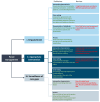Tailoring remote patient management in cardiovascular risk management for healthcare professionals using panel management: a qualitative study
- PMID: 38643103
- PMCID: PMC11031879
- DOI: 10.1186/s12875-024-02355-y
Tailoring remote patient management in cardiovascular risk management for healthcare professionals using panel management: a qualitative study
Abstract
Background: While remote patient management (RPM) has the potential to assist in achieving treatment targets for cardiovascular risk factors in primary care, its effectiveness may vary among different patient subgroups. Panel management, which involves proactive care for specific patient risk groups, could offer a promising approach to tailor RPM to these groups. This study aims to (i) assess the perception of healthcare professionals and other stakeholders regarding the adoption and (ii) identify the barriers and facilitators for successfully implementing such a panel management approach.
Methods: In total, nineteen semi-structured interviews and two focus groups were conducted in the Netherlands. Three authors reviewed the audited transcripts. The Consolidated Framework for Implementation Strategies (CFIR) domains were used for the thematic analysis.
Results: A total of 24 participants (GPs, nurses, health insurers, project managers, and IT consultants) participated. Overall, a panel management approach to RPM in primary care was considered valuable by various stakeholders. Implementation barriers encompassed concerns about missing necessary risk factors for patient stratification, additional clinical and technical tasks for nurses, and reimbursement agreements. Facilitators included tailoring consultation frequency and early detection of at-risk patients, an implementation manager accountable for supervising project procedures and establishing agreements on assessing implementation metrics, and ambassador roles.
Conclusion: Panel management could enhance proactive care and accurately identify which patients could benefit most from RPM to mitigate CVD risk. For successful implementation, we recommend having clear agreements on technical support, financial infrastructure and the criteria for measuring evaluation outcomes.
Keywords: Cardiovascular disease; Panel management; Prevention and management; Proactive care; Remote patient management.
© 2024. The Author(s).
Conflict of interest statement
The authors declare no competing interests.
Figures


References
-
- Roth GA, Mensah GA, Johnson CO, Addolorato G, Ammirati E, Baddour LM et al. Global Burden of Cardiovascular Diseases and Risk Factors, 1990–2019: Update From the GBD 2019 Study. J Am Coll Cardiol. 2020 [cited 2022 Jul 18];76(25):2982–3021. https://pubmed.ncbi.nlm.nih.gov/33309175/ - PMC - PubMed
-
- Giedrimiene D, King R. Burden of Cardiovascular Disease (CVD) on Economic Cost. Comparison of Outcomes in US and Europe. Circ Cardiovasc Qual Outcomes. 2017 [cited 2022 Jul 18];10(suppl_3). https://www.ahajournals.org/doi/abs/10.1161/circoutcomes.10.suppl_3.207
-
- Yusuf PS, Hawken S, Ôunpuu S, Dans T, Avezum A, Lanas F et al. Effect of potentially modifiable risk factors associated with myocardial infarction in 52 countries (the INTERHEART study): Case-control study. Lancet. 2004 [cited 2020 Nov 24];364(9438):937–52. http://www.thelancet.com.vu-nl.idm.oclc.org/article/S0140673604170189/fu... - PubMed
-
- Liu K, Daviglus ML, Loria CM, Colangelo LA, Spring B, Moller AC et al. Healthy lifestyle through young adulthood and the presence of low cardiovascular disease risk profile in middle age: the Coronary Artery Risk Development in (Young) Adults (CARDIA) study. Circulation. 2012 [cited 2022 Mar 3];125(8):996–1004. https://pubmed.ncbi.nlm.nih.gov/22291127/ - PMC - PubMed
-
- Kotseva K, De Backer G, De Bacquer D, Rydén L, Hoes A, Grobbee D et al. Lifestyle and impact on cardiovascular risk factor control in coronary patients across 27 countries: Results from the European Society of Cardiology ESC-EORP EUROASPIRE V registry. Eur J Prev Cardiol. 2019 [cited 2022 Aug 10];26(8):824–35. https://pubmed.ncbi.nlm.nih.gov/30739508/ - PubMed
MeSH terms
Grants and funding
LinkOut - more resources
Full Text Sources
